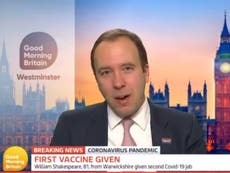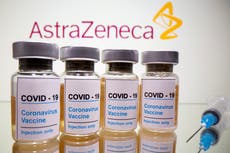UK coronavirus deaths up by 616, as first vaccines rolled out
More than 12,000 new infections recorded as nation embarks on mass vaccination campaign
Your support helps us to tell the story
From reproductive rights to climate change to Big Tech, The Independent is on the ground when the story is developing. Whether it's investigating the financials of Elon Musk's pro-Trump PAC or producing our latest documentary, 'The A Word', which shines a light on the American women fighting for reproductive rights, we know how important it is to parse out the facts from the messaging.
At such a critical moment in US history, we need reporters on the ground. Your donation allows us to keep sending journalists to speak to both sides of the story.
The Independent is trusted by Americans across the entire political spectrum. And unlike many other quality news outlets, we choose not to lock Americans out of our reporting and analysis with paywalls. We believe quality journalism should be available to everyone, paid for by those who can afford it.
Your support makes all the difference.A further 616 people have died in the UK within 28 days of testing positive for coronavirus, bringing the toll to 62,033.
However, as of Friday, Covid-19 has been mentioned on 73,125 death certificates.
The number of new infections reported on Tuesday fell to 12,282 – down from a seven-day average high of more than double that number just less than a month ago, Public Health England figures show.
And according to the most recent government statistics, there are 14,807 patients in hospital with coronavirus. Some 1,458 new patients were reported on Thursday, the latest day for which figures are available.
It comes as the first doses of the Pfizer/BioNTech vaccine were administered across the UK after the jab was approved by regulators last week.
Margaret Keenan, 90, was the first person to receive the inoculation, at 6.31am in University Hospital Coventry, marking the start of a phased rollout of the vaccine to older people, NHS staff and care home workers.
Second in line, just 20 miles from the birthplace of England’s greatest dramatist in Stratford-upon-Avon, was William Shakespeare’s 81-year-old namesake.
Fifty hospital hubs will now be distributing the vaccine, with some 800,000 doses expected to be available within the first week, and up to five million doses in total hoped for by New Year.
On Monday, Downing Street suggested the “majority” of the 25 million people covered by the 10 priority categories set out by the Joint Committee on Vaccination and Immunisation (JCVI) will be vaccinated by the end of February.
Meanwhile, AstraZeneca and the University of Oxford have published the long-awaited analysis of their interim trial results, showing their vaccine to be safe and 90 per cent effective when administered in a half dose followed by a full dose, compared with 62 per cent effective using two full doses.
The data published in The Lancet has already been passed on to drug regulators to finalise their rolling vaccine reviews, and the health secretary Matt Hancock said he is hopeful that regulatory approval will be granted in the next few weeks.
But phase three trials are still ongoing and the report’s author Dr Merryn Voysey said that further analysis of the jab was required to “investigate differences in key subgroups such as older adults, various ethnicities, doses [and] timing of booster vaccines”, adding that researchers will also seek to “determine which immune responses equate to protection from infection or disease”.
The positive news came as Nicola Sturgeon announced that all areas of Scotland in the toughest level of restrictions, including Glasgow, are to be moved to lighter controls from Friday.
And Mr Hancock said he hopes there can be a return to normality by spring, but warned tougher measures may be needed during the winter months.




Join our commenting forum
Join thought-provoking conversations, follow other Independent readers and see their replies
Comments